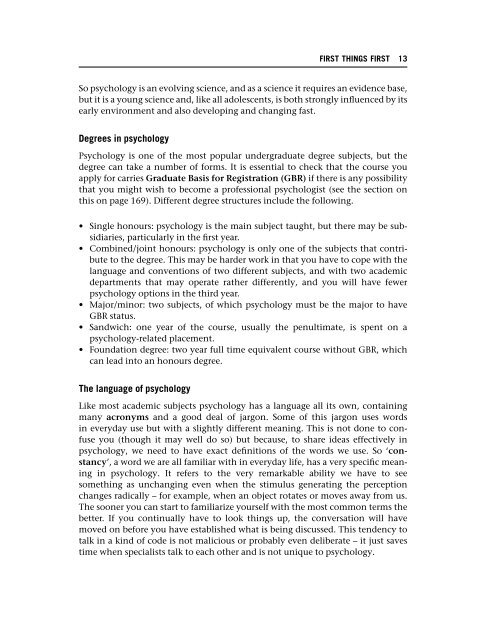Psychology - Forgot your username
Psychology - Forgot your username
Psychology - Forgot your username
You also want an ePaper? Increase the reach of your titles
YUMPU automatically turns print PDFs into web optimized ePapers that Google loves.
So psychology is an evolving science, and as a science it requires an evidence base,<br />
but it is a young science and, like all adolescents, is both strongly influenced by its<br />
early environment and also developing and changing fast.<br />
Degrees in psychology<br />
<strong>Psychology</strong> is one of the most popular undergraduate degree subjects, but the<br />
degree can take a number of forms. It is essential to check that the course you<br />
apply for carries Graduate Basis for Registration (GBR) if there is any possibility<br />
that you might wish to become a professional psychologist (see the section on<br />
this on page 169). Different degree structures include the following.<br />
• Single honours: psychology is the main subject taught, but there may be subsidiaries,<br />
particularly in the first year.<br />
• Combined/joint honours: psychology is only one of the subjects that contribute<br />
to the degree. This may be harder work in that you have to cope with the<br />
language and conventions of two different subjects, and with two academic<br />
departments that may operate rather differently, and you will have fewer<br />
psychology options in the third year.<br />
• Major/minor: two subjects, of which psychology must be the major to have<br />
GBR status.<br />
• Sandwich: one year of the course, usually the penultimate, is spent on a<br />
psychology-related placement.<br />
• Foundation degree: two year full time equivalent course without GBR, which<br />
can lead into an honours degree.<br />
The language of psychology<br />
FIRST THINGS FIRST 13<br />
Like most academic subjects psychology has a language all its own, containing<br />
many acronyms and a good deal of jargon. Some of this jargon uses words<br />
in everyday use but with a slightly different meaning. This is not done to confuse<br />
you (though it may well do so) but because, to share ideas effectively in<br />
psychology, we need to have exact definitions of the words we use. So ‘constancy’,<br />
a word we are all familiar with in everyday life, has a very specific meaning<br />
in psychology. It refers to the very remarkable ability we have to see<br />
something as unchanging even when the stimulus generating the perception<br />
changes radically – for example, when an object rotates or moves away from us.<br />
The sooner you can start to familiarize <strong>your</strong>self with the most common terms the<br />
better. If you continually have to look things up, the conversation will have<br />
moved on before you have established what is being discussed. This tendency to<br />
talk in a kind of code is not malicious or probably even deliberate – it just saves<br />
time when specialists talk to each other and is not unique to psychology.






